A well-performing website is often perceived as a lucrative but challenging endeavor.
It seems everything has already been said and written online, and there is no way to get noticed in all that noise.
Many people are reluctant to spend time and energy on something that might not turn into a profitable hustle in the future. They often hear biased talks that SEO is dead and unsure of what to do next.
Over 90% of all web pages get zero organic traffic, according to Ahrefs. This discovery might shake the confidence of anyone willing to do SEO for a new website.
“Does it still make sense to do SEO for a brand new website in times of uncertainty?” – You might wonder. As a marketer and a website owner, I will undoubtedly say “YES.”
The first right moment to launch a new website was a decade ago, but the second-best chance is to do it now.
I launched Self Made Millennials in July 2021 without a clear goal. It was my part-time project for marketing experiments. However, in six months of consistent work and SEO writing, my website reached the first Google page for several keywords and gained over 30,000 impressions.
This article will talk about how I implemented SEO on my website and achieved results. I’ll also answer the following popular questions in the article:
- What to know before working on a new website for SEO
- Most important SEO steps for a brand new website
- SEO requirements and strategy for a new website
- How to do SEO for a new website step-by-step
Besides, I’ll share my comprehensive SEO checklist for a new website.
What to know before working on a new website for SEO
Many website owners believe that producing a lot of content will help them reach more users online. However, that’s a delusion.
It’s worth knowing how your content becomes searchable before starting SEO for a new website.
According to Google, every new web page you publish goes through the following process:
- Crawling
- Indexing
- Ranking
It might sound odd, but the first reader of your content is the Google bot. It’s the algorithm designed to browse the Internet and crawl (in other words, read) web pages. Some pages might already be known to the Google bot because it has already crawled them earlier. In comparison, new pages are discovered when Google bot follows links from known pages to unknown.
What happens when the Google bot detects a new page? Right! Indexing.
What is indexing, and why it’s important for SEO for a new website?
When the Google bot discovers a new page, it starts analyzing the on-page content. Then, it defines if your page is in line with the Google quality guidelines and if it should be added to the main index.
Google’s main index had over 30 trillion pages in 2013. This number has been up an astonishing 30 times in the past five years, according to Venturebeat.
If you want to get noticed on search, your content should be part of Google’s main index. Otherwise, your chances for successful organic performance are zero.
If you follow basic SEO for a new website and your content aligns with Google’s best practices, you’ll see the following happy message in Google Search Console.
It might take a few hours to days for Google to index a new page. I requested manual indexing in my example below and waited two days to get a desired “URL is on Google” message.
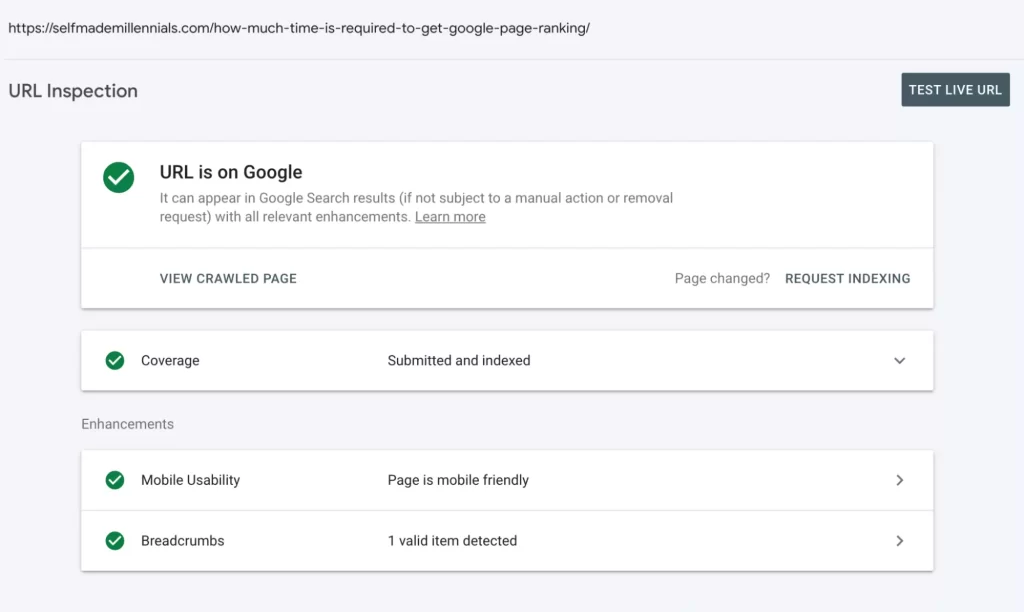


Your website structure matters a lot when it comes to user experience and indexing.
The 3-click rule says that every website page should be accessible in three clicks or less. This way, your users will quickly find all desired information and won’t be frustrated. Even though data do not back up this rule of thumb, clear navigation will help search engine bots discover and index your new pages faster. Therefore, consider creating a simple tree-like website structure before planning an SEO strategy for a new website.
If your website does not show up on Google, check if you experience these issues. You might struggle with discovered/crawled – not indexed issue, a no-index tag, or a messed up robots.txt file.
When to start SEO for a new website
As a marketer, I worked for several companies, where I noticed the following tendency. Companies hire marketers to attract more clients and generate higher profits. They assume a marketer is a “wizard” who can quickly fix website technical issues, usability problems and make unoptimized content rank high on Google fast.
I admit it’s a marketer’s job to attract the target audience to the website. However, it’s challenging to achieve the goals if no one has worked on website optimization and performance for years.
What’s the SEO strategy for a new website? And when should you start SEO for a new website? As a marketer and a website owner, I can tell you that SEO starts during the website planning phase. Consider the following before you create your first website:
- Research the most suitable hosting provider.
- Have a website structure planned.
- Draft technical requirements for a developer (if you work with a developer).
- Do keyword research.
Let me briefly explain every point from the list above.
Every website should be “hosted” somewhere to be accessible on the Internet. Many companies provide web hosting services to store and maintain websites. It’s essential to select a reliable hosting provider because your website performance will heavily depend on it.
Some hosting providers, like Bluehost, claim to provide the most reliable hosting services for WordPress websites. However, I faced many issues with the website loading speed due to slow server response time.
After some research, I figured out that I could improve my website performance by switching to a faster hosting provider. Why is it important? Google has confirmed that loading speed is a ranking factor. Therefore, it’s a must to have a fast website to rank well on search.
Consider website structure as one more SEO requirement for a new website. Easy-to-understand website structure facilitates navigation and helps Google bot find and index new pages faster.
You can see my blog structure below. I created it as a part of the SEO plan for a new website and shared it with a developer. It’s a simple pyramid-like website structure.
A website tree helps you visualize your content hierarchy, define the most important pages and see whether other pages are easily accessible.
I started my website with two categories — SEO Writing and Side Hustles. The goal is to have all related content listed on those pages for better user experience and indexing.
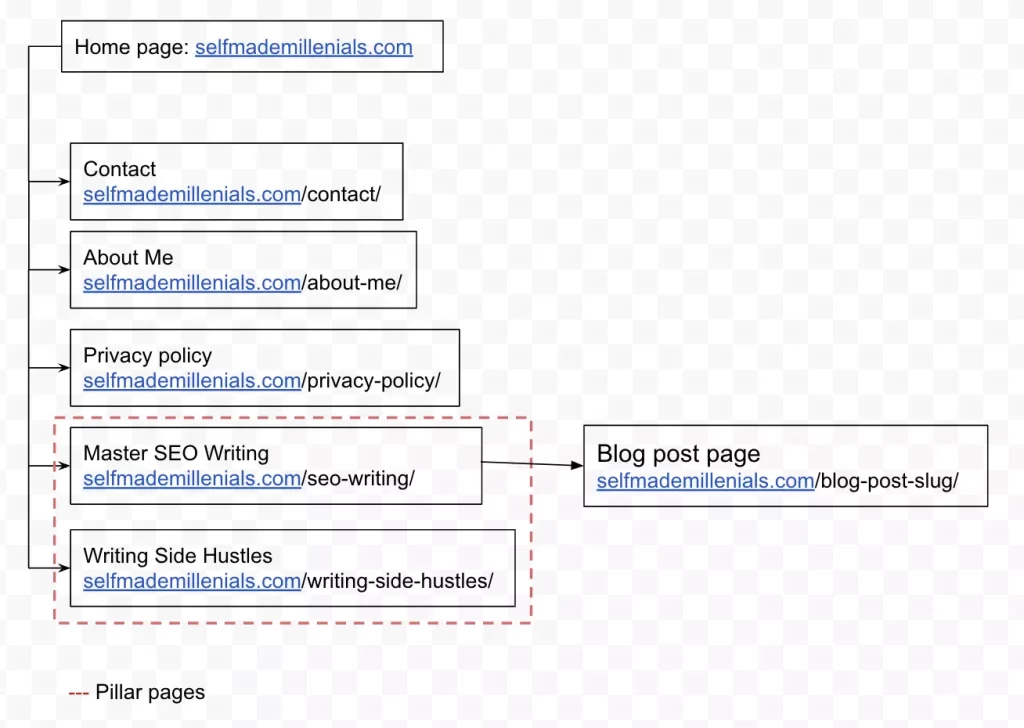


Once you are ready with the website structure, draft technical requirements for developers (if you work with any.) It’s good to explain your goals behind particular decisions. For instance, you can explain why you want your blog post pages to have a nesting level one.
I aimed for articles nesting level one and explained that it’s essential for SEO. Google assigns higher priority to the content of the upper levels.
Besides, you can also mention that you’ll be checking the website speed before accepting developers’ work. So, they should better not include any extra and irrelevant code lines.
As a part of the SEO optimization process for a new website, I recommend conducting keyword research. It should be the first step before producing any content for your website. Why? Optimized content that takes into account demand and competition has higher chances to rank high on search engines.
My website got over 30,000 impressions, with two pages ranking on the first Google result page solely thanks to keyword research. If done right, your website can reach high search engine positions for low competitive and high volume keywords.
How to do SEO for a new website
I’ve talked about the importance of choosing a reliable hosting provider, planning a website structure, and drafting technical requirements. It will be challenging to achieve success in organic search without these basic SEO steps for a new website.
Now, I want to share a bit more on how you can create a content plan for a new website with the help of keyword research.
Every content creator asks the following question occasionally: “What should I write about?” They usually don’t know what to write about because they cannot prioritize their ideas effectively.
Keyword research will help you understand which search terms have the immense potential to attract the target audience to your website.
As a marketer, I recommend collecting at least 50 keywords for your content before you jump into writing. This way, you’ll know what to write about and won’t waste time on low-impact tasks.
Have a look at my keyword research for the SEO writing website category. Before handpicking the most promising ones, I researched the global volume (demand) and competitiveness (keyword difficulty) for hundreds of keywords.
I have an in-depth article about content writing tools that can help you effectively do keyword research for your website.
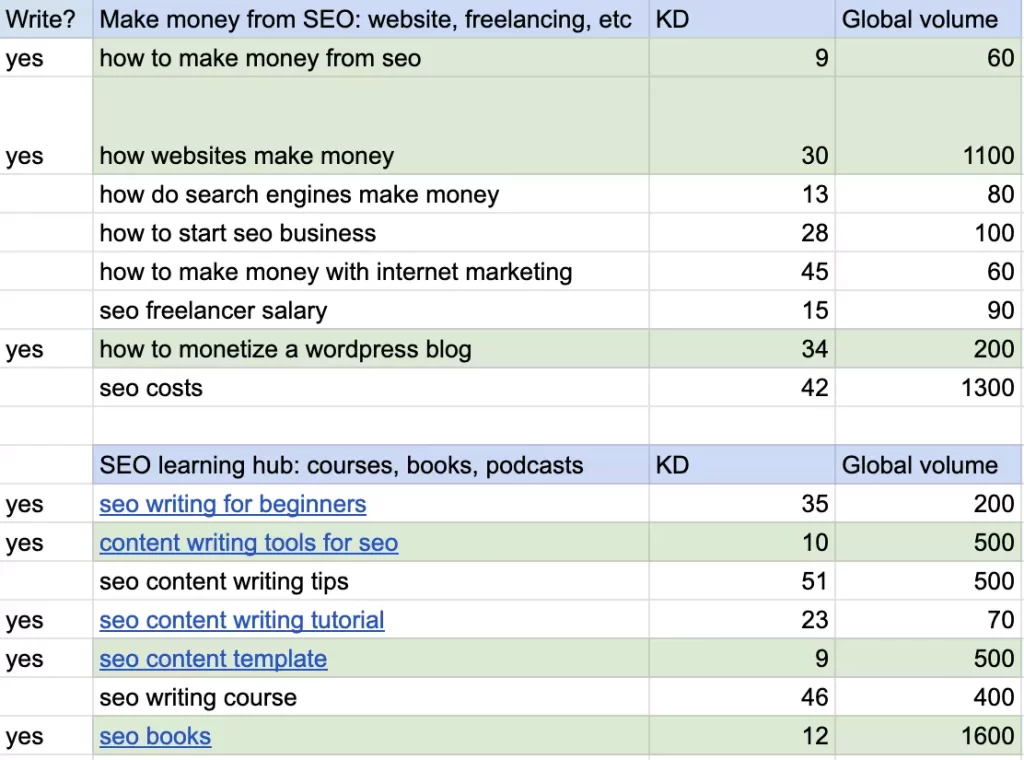


I’ve already written a well-performing article on how to make money from SEO and how to monetize a WordPress website. Now, I focus on growing my SEO learning hub.
Once the keyword is chosen, collect semantically related keywords for your article. This way, your content has higher chances to rank high on Google for many contextually related keywords.
Besides, semantically related keywords show you what people look for online. You can use them to create outlines for your content.
You can see my research for the “content marketing books” keyword using Ahrefs. I’ve checked all competitors on the first Google result page and collected their semantically related keywords.
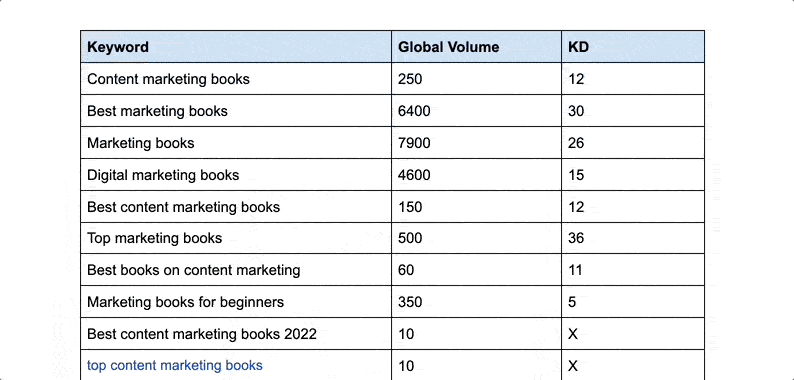


The goal of any new website is to grow in impressions, in the number of pages, views, and rankings.
A quick keyword research process outlined above is the best SEO advice for any new website.
Besides optimized content production, I practice the following SEO strategies for my new WordPress website:
- 2-5 backlinks acquisition monthly (free links and guest posting).
- Posting one answer on Quora daily (establishing trust and redirecting traffic to my website).
- Using Medium for backlink and traffic acquisition.
- Optimizing my website speed using Page Speed Insights.
- Creating 3-4 in-depth and well-optimized blog posts monthly.
I achieved the following performance results in the first six months of working on my website next to my full-time job:
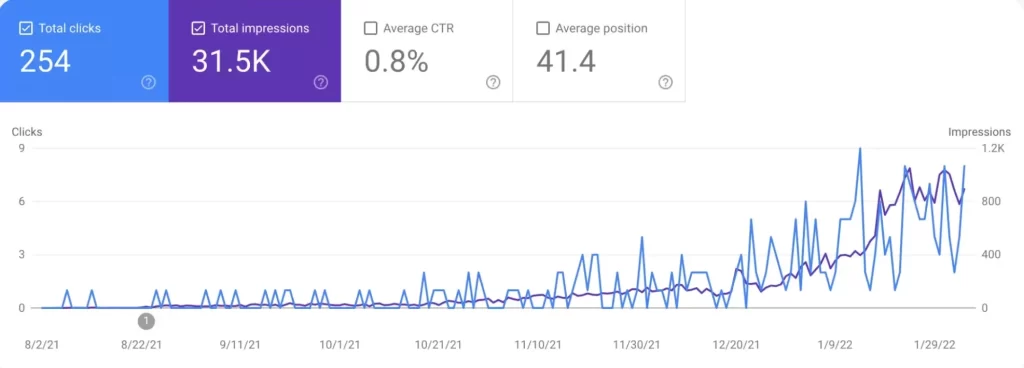


SEO checklist for a new website
Wondering how to set up SEO for a new website? Looking for SEO tips for a new website? Here is my comprehensive SEO checklist for a new website I’ve been using to grow my website.
Before launching a new website
- Find a reliable hosting provider (Bluehost is not the best solution if you run a WordPress website, based on my experience.)
- Create an easy-to-navigate website structure (a simple website structure is good for user experience and indexing new pages.)
- Draft website technical requirements (like URL structure, loading speed best practices and standards, Google Tag Manager code inclusion, etc.)
- Do keyword research (collect SEO keywords for your website.)
After launching a new website — SEO best practices for a new website
Like a baby, a new website requires your attention and care all the time.
As a website owner, I’ve been through all the hustle related to the website launch and growth. In fact, I am still struggling with lots of website-related tasks. However, it’s much easier if you have a clear SEO website checklist for a new WordPress website.
Here is my SEO to-do list for a new website to help you prioritize your efforts. It’s ideal if you work on your website as a side hustle next to the full-time job:
Daily
- Check website impressions in Google Search Console.
- Check website indexability in Google Search Console (fix issues if there are any and submit pages for reindexing.)
- Write at least 500 words for optimized content production.
- Promote your website on Quora (write at least one response daily.)
Weekly
- Check your Google Analytics traffic stats.
- Check your website loading speed. If it’s low, prioritize issues and start researching the solution.
- Publish a new optimized blog post (aim for at least one article weekly.)
- Build 1-2 backlinks.
- Check where you stand with your quarterly website goals (I recommend setting measurable and achievable goals for three months, like traffic and domain rank growth.)
Monthly
- Check if you achieved your monthly SEO goals (plan how to speed up SEO for a new website if needed.)
- Run an SEO audit and define any critical issues to tackle the following month.
- Check your website traffic (Google Analytics) and domain rank (use SEO tools.)
- Conduct keyword research.
- Plan 3-4 new optimized content pieces.
- Create a monthly SEO plan for a new website, keeping in mind your quarterly goals.
If you wonder how to increase an SEO score for a new website, this SEO checklist will help you prioritize your efforts and achieve visible SEO results for your website.
The above-mentioned best SEO strategy for a new website is straightforward and beginner-friendly. Let me know if it works for you in the comments below.
FAQ: SEO how to start
How often does a website need new content for good SEO?
More content implies more traffic. Moreover, more content means more frequent website indexing by search engine bots.
Whenever you update your website, web crawlers stand by, index your content again and rearrange your rankings. Therefore, publishing frequently will theoretically help your website grow faster and perform better.
Hubspot shares that small blogs should publish new content 3-4 times a week to maximize organic traffic. At the same time, established blogs should publish new posts or make changes to the old ones 4-5 times a week.
Google likes frequently updated websites and rewards them with more impressions and higher rankings.
Quantity matters, but it’s not a holy grail. Quality is the decisive factor here.
If you manage your website independently, creating many well-optimized blog posts weekly might lead to burnout. In this case, a healthy balance is needed to manage SEO for a new website.
I publish 3-4 optimized articles with over 3,000 words monthly. Based on my experience, optimized content performs best on Google. Therefore, I don’t compromise quality to publish more frequently. Besides, I make minor changes to my website, like editing existing blog posts, improving website loading speed, adding new pages (guest post policy), replacing images, etc.
Consistency is more important than speed. Therefore, prioritize your effort to show up on Google with fresh and helpful content continuously.
Best SEO tools for researching a new website
It’s easy to get lost figuring out which SEO tools are worth trying.
Even the most experienced marketers might be confused because new tools appear every day, and it’s physically impossible to stay on track with everything.
As a marketer, I’ve tried dozens of free and paid marketing tools in the past years. I listed my proven-to-work content marketing tools in this article.
If your goal is to grow a website on a budget without wasting valuable time on new tools, I recommend checking the following SEO tools:
1. Ahrefs (keyword research, website performance tracking, and audit).
2. Semrush and Moz (two great Ahrefs alternatives with free plans available).
3. LSI graph (semantically related keywords research).
4. Similarweb (check competitors’ website stats and traffic acquisition channels).
5. Google tools (Google Analytics, Google keyword planner, Google Trends).
These tools should be sufficient to research and plan an SEO strategy for a new website.
How many pages should a new website have for SEO?
My website had a few pages only when I released it. I waited two weeks for Google to crawl and index it. Since then, my website has been steadily growing.
In fact, there is no minimum page threshold for SEO. It depends on your website’s purpose and new content publication frequency.
If you run a blog or an ecommerce site, you can start with a few pages and consistently add new content.
I’ve mentioned earlier that more content means more frequent indexing. However, quality is a decisive factor here!
SEO.co discovered that most websites experience a decreasing marginal return after roughly 30 blog posts per month. They claim that starting with two blog posts a week is a healthy alternative for SEO for new websites regardless of their starting point.



Hello there!
My name is Victoria.
I am an SEO expert, Medium top writer, solopreneur, and the founder of Self Made Millennials. I help companies create optimized content and attract potential customers through organic search results. In addition, I share how content creators can monetize their writing skills.
Free SEO email course
Latest posts
Grab my SEO ebook
Related blog posts
SEO writing How to Rank Without Backlinks In 2023 written by Victoria Kurichenkoupdated on October 16, 2022If keyword stuffing could grant you top ranking a decade ago, it’s no longer the case nowadays. Google has become smarter, and now, it pays attention to users’ search intent and behavior instead of …
SEO writing How to Make Money From SEO In 2024 written by Victoria Kurichenko updated on October 16, 2022 1 in 3 Americans run a side hustle next to their full-time job, according to Zapier research, and the number of side hustlers is steadily growing! Someone works overtime because the …



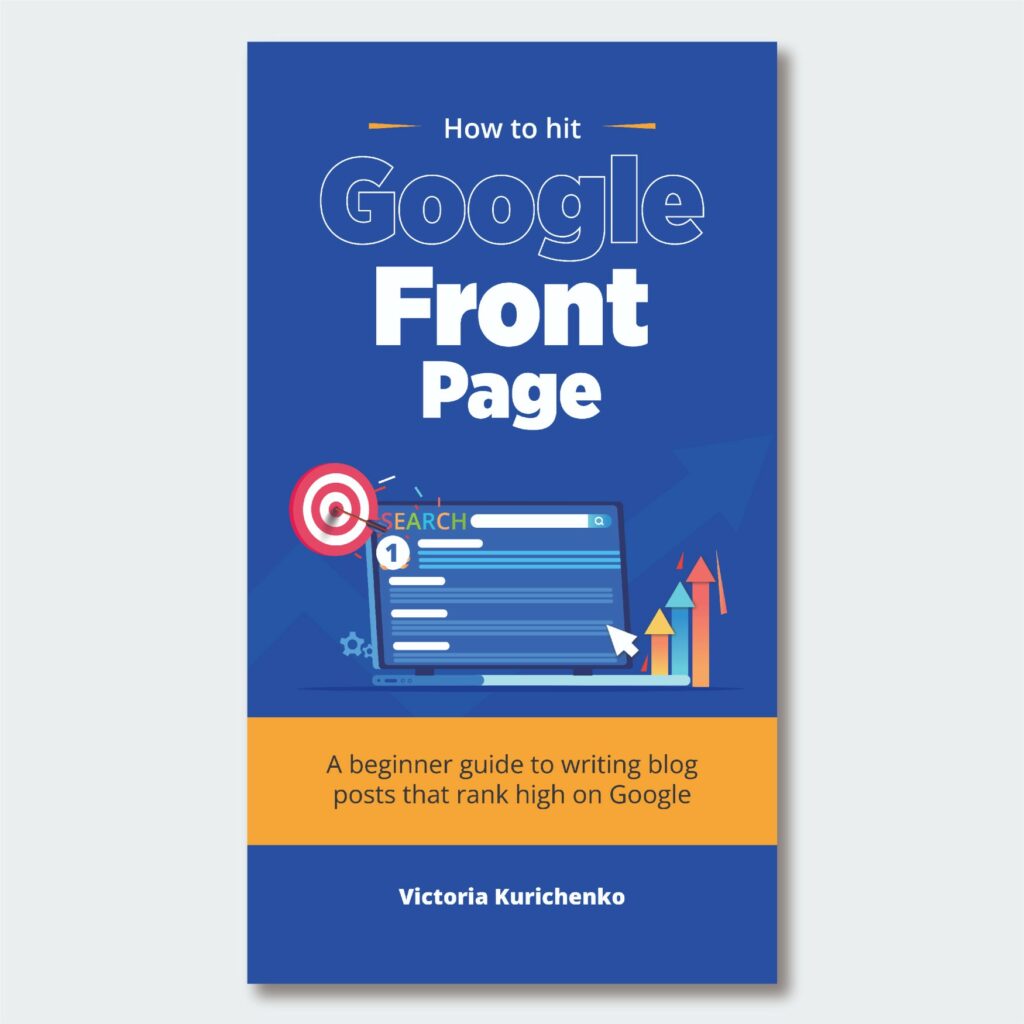
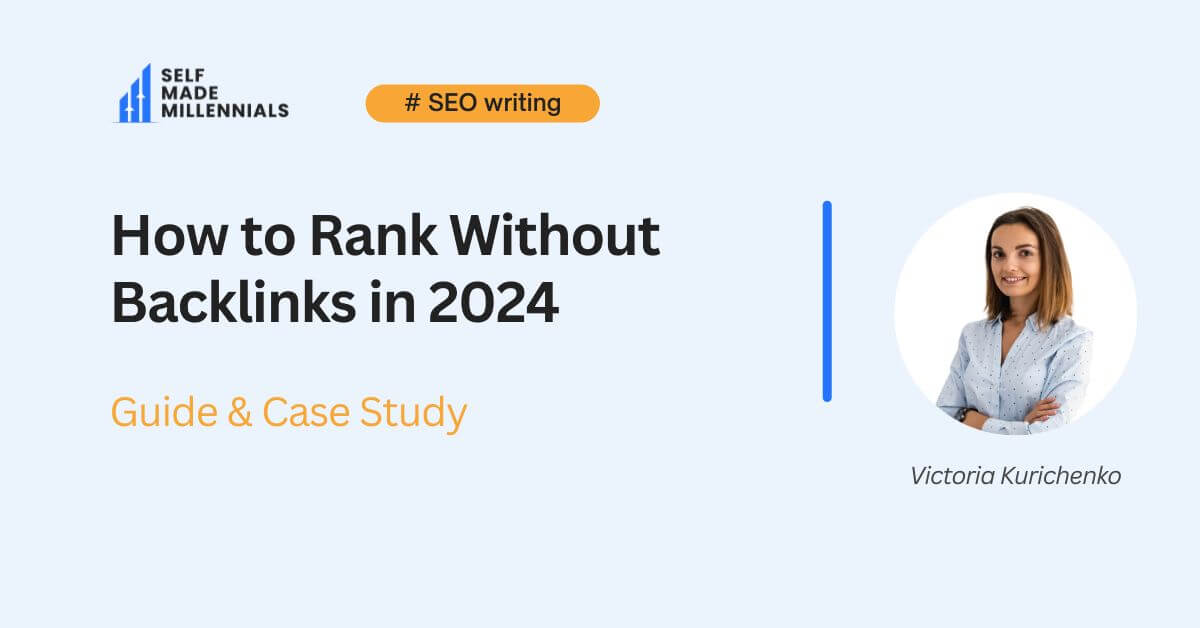

5 Responses
I’m trying to set some clear, SMART objectives for my new site. I’d like to increase organic traffic, but obviously percentages are going to be ridiculous as anyu increase on ) looks impressive even if it’s just 1 person (100% increase!) so how can I create a measure for increasing organic traffic for a new website without it seeming ridiculous?
Great article by the way!
It’s an awesome rationalization about search engine optimization. It’s very certain and enables me to make a better. thank you for sharing.
Thank you! 🙂
Thanks for sharing this guide on how to create a successful website while focusing on your webpage message! SEO is indeed highly important as this helps you gain more traffic. However, do you think SEO is as important when it comes to small brands? Especially for those with a limited marketing budget.
Hi,
Thank you for reading my article! 🙂
As to your question: SEO is a long-term investment, which can help you get a steady flow of leads once you establish an online presence. Based on my experience, I know that it works for both small companies and enterprises. I would recommend conducting keyword research and defining a few keywords with business potential you can start with.